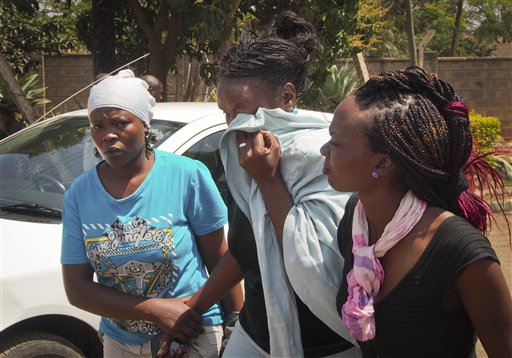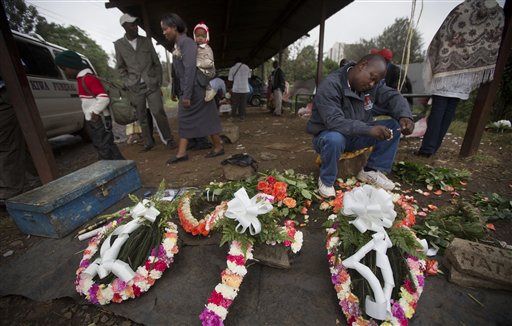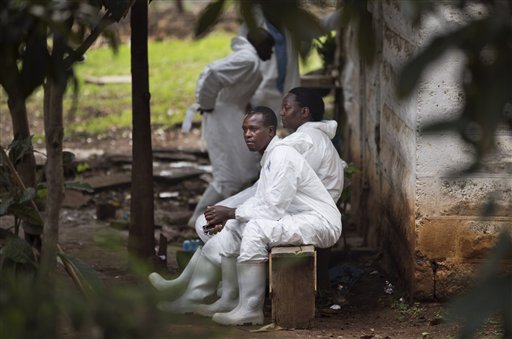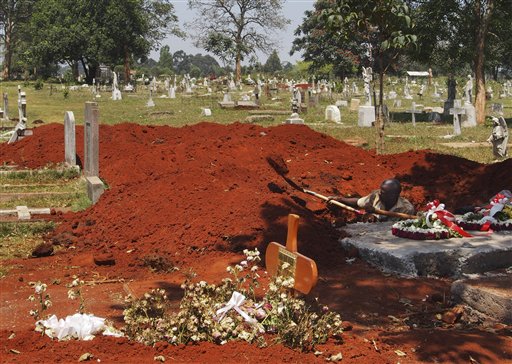NAIROBI, Kenya — Karen Wambui walked slowly through the Nairobi city morgue’s turquoise and yellow iron gates, still trying to process what she had seen inside.
She had just confirmed that the last body still there from the Westgate Mall attack nearly a week earlier was that of her son, Calan Munyaka.
The 27-year-old was one of 37 victims of the al-Shabab terrorist assault whose bodies were brought to the single-story main morgue building in the Kenyan capital, where a crucifix is nailed above the wooden entrance doors and the smell of the dead drifts out the open windows. Other bodies were taken to city hospitals and elsewhere.
For nearly a week, Munyaka lay in the morgue, identified only as “Kenyan male, adult.”
On Friday afternoon, the pathologists pulled Munyaka’s corpse from a refrigerated chamber and showed Wambui.
“I’ve just seen a gunshot,” she said, wiping her eyes with a light blue sweatshirt. “Here,” she added, pointing to the left side of her neck.
Officials say at least 61 civilians and six security troops were killed in the four-day takeover of the mall by the al-Qaida-linked militant group. With the Kenyan Red Cross reporting an additional 59 people still missing, the toll is expected to rise and the morgue may fill up again, though the government maintains it has no reports of anyone unaccounted for.
Over the weekend at the city’s main cemetery on Langata Road, a single gravedigger labored in the morning sun, clawing away at the deep-red soil with a shovel and pitchfork in preparation for more burials.
The Westgate Mall was packed with midday Saturday shoppers on Sept. 21 when the teams of al-Shabab gunmen stormed the building and opened fire. Authorities believe as many as 15 attackers were involved, but only six of their bodies have been identified so far — five who were said to have been killed by security forces’ gunfire and one who died in the rubble of the building’s collapsed roof.
The Nairobi mall was patronized by the Kenyan elite and wealthy foreigners, but Calan Munyaka was neither of those. He sold clothes for a living but didn’t work at the mall, his mother said.
Her last conversation with him was by telephone two weeks earlier, and he was excited, introducing her to his new fiancee and announcing she was a month pregnant. He worked out plans with his mother for the three of them to meet in person next month.
Wambui watched the mall attack drama unfold on television from her home in the city of Kisumu, hundreds of miles away on Lake Victoria. She had no idea her son was at the mall and still has no idea why he was there.
But she knows he was one of the first to die.
Munyaka’s body was among the first brought to the city morgue on the first two days of the siege.
Slowly over the course of the week at the morgue, autopsies were completed on the row of stainless steel tables that sit under open windows, with experts from Canada, Germany, the international police agency Interpol, the FBI and elsewhere aiding Kenyan pathologists.
Relatives were notified, and one by one, the bodies were picked up and buried.
As Wambui entered the morgue, an aging black Land Rover with a worn clutch left the complex, edging its way slowly up the sloped driveway. A plain wooden casket was tied with ropes to the roof rack, a black tarp over it. Inside was the next-to-last body from the mall to leave the morgue, leaving only Calan Munyaka’s.
Wambui didn’t even know her son was dead until five days after the fact.
Earlier in the week, her two other sons — both of whom also live in Nairobi — grew worried when they couldn’t get in contact with him and started searching. They started with the hospitals, optimistically hoping to find him in one of the crowded wards.
“Then they came here,” Wambui said.
On Thursday, they were shown the last unidentified body in the morgue from the mall attack. It was their brother.
After they called Wambui and broke the news to her, she boarded an overnight bus for the long ride to Nairobi, and headed straight to the morgue to see for herself.
After confirming what she dreaded, she had to leave so that a post-mortem examination could be done.
“I just want to bury my son,” she said in frustration. “He was my firstborn.”
At least, she said, there was slight solace in knowing her son’s fate.
“There are others who still don’t know,” she said.
Not long after Wambui left, a long convoy whisked through the busy intersection next to the morgue, carrying President Uhuru Kenyatta to his hometown of Gatundu, about 45 minutes outside of the city.
He was on his way to bury his nephew and his nephew’s fiancee — two other victims of the Westgate Mall attack whose fate attracted the attention of the nation.
But for Calan Munyaka there was no fanfare.
Wambui returned later Friday and quietly took her son’s body away.
Send questions/comments to the editors.






Success. Please wait for the page to reload. If the page does not reload within 5 seconds, please refresh the page.
Enter your email and password to access comments.
Hi, to comment on stories you must . This profile is in addition to your subscription and website login.
Already have a commenting profile? .
Invalid username/password.
Please check your email to confirm and complete your registration.
Only subscribers are eligible to post comments. Please subscribe or login first for digital access. Here’s why.
Use the form below to reset your password. When you've submitted your account email, we will send an email with a reset code.